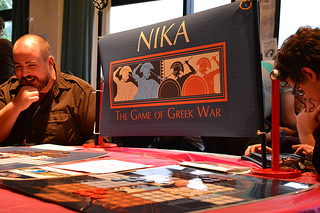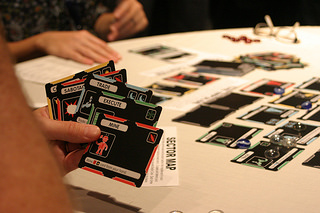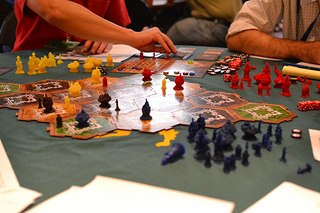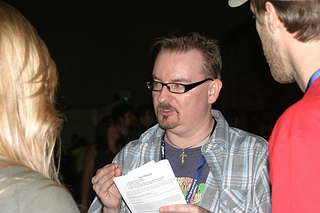As we hurdle towards the end of June’s Indie Spotlight focus on the Boston Festival of Indie Games, we thought it would only be fitting if we focused on its future. Boston FIG has only been around for a few years, but it’s already made a name for itself among designers in the New England region. If Director Aerjen Tamminga and Tabletop Coordination Producer Glenn Given have anything to say on the matter, they hope it’ll continue to grow and evolve for years to come.
But you don’t have to take our word for it. Take theirs. You probably already know we think it’s important to the hobby.
We had a chance to chat with Aerjen and Glenn about Boston FIG, and we thought we’d share their take on its importance to the gaming community, its efforts to give back, and what lies in store for Boston FIG 2014.
A Flurry of Pixels and Paperwork
Cardboard Republic: Boston FIG was conceived out of bringing attention to the local indie gaming design scene. In your view, how does it contribute to that purpose?
Aerjen: Excellently, I’d say. To be precise, the festival celebrates independent game development in New England and neighboring regions. Our goal is to create an inclusive environment for everybody who enjoys and appreciates games in whatever shape or form. The festival seeks to support and showcase the efforts of independent game developers, as well as youth programs focused on game development and related fields.
Since this year, the Boston Festival of Indie Games is a registered non-profit with the State of Massachusetts, dedicated to fostering the next generation of game developers. Through youth and small-business outreach initiatives culminating in the yearly festival, the Boston Festival of Indie Games strives to strengthen the game development industry of New England.
This year we had over 200 submissions from local game designers. They will all receive feedback from a team of game design professionals, and when they make it into the festival there’s about 10,000 attendees looking to play their games.
Glenn: I think that Boston FIG represents a tangible and accessible goal for designers who can often feel like their work is lost. The ease of submission to the festival, the professional feedback and the crowded event itself are geared to motivate the indie designer and remind them that they are not just slaving away in solitary. At Boston FIG you get to see that you are part of a community of creators who come from as humble roots as you do.
CR: Boston FIG has grown substantially in the last few years. What’ s your reaction to its rise in attention?
Glenn: I love it! I think any fan facing festival that can show 10,000 pople the raw and unfiltered work of artists deserves to grow exponentially.
Aerjen: I’m really happy and pleasantly overwhelmed by the growth of the festival. Without that amount of support from the community we wouldn’t have been able to grow our youth outreach endeavors.
CR: What would you say is the biggest contributor to that fact?
Aerjen: That’s hard to say. I feel it’s the combination of teams of volunteers working very hard each year to put together an amazing festival, local designers embracing us, and having a festival where everyone has an excellent experience.
Glenn: Strong showings year over year. Boston FIG has built a reputation for caring about the indie designers and for bending over backwards to showcase them. The care that we take pays off when those designers do half of our promotion for us.
Building A Better Mouse Trap Game
CR: Originally, Boston FIG was primarily video game focused, but over the last couple years it seems to have moved closer to like a 70 / 30 split between indie video game tabletop designers. Do you eventually see the festival having something closer to an even split?
Aerjen: Boston FIG was originally mostly video game focused. In it’s inaugural year there was a small tabletop presence. But you’re right; it’s been moving from nearly non-existent to 70/30, and this year’s submissions is approximate 60/40. Being a tabletop aficionado I’d love to see a more even split. At the same time, I think the mix we have right now is about right. Especially now that we have a space for tabletop that completely dwarfs last year’s space.
Glenn: I would not be surprised if we come close to parity this year. Tabletop games have been experiencing a golden age of late and while the community of designers is not as edgy or glamorous as their digital brethren, we are fierce competitors.
CR: Can you elaborate on some of differences that have been made to the event from last year?
Glenn: Most importantly is that we have more than doubled the size of the tabletop segment of the festival. This year digital and analog game space will be far closer to 50/50 than any prior year and we intend on making the most of that increased profile. Additionally we have moderately expanded the eligible submission area, so you are likely to see games from Washington DC up to Toronto and all across the Northeast.
Aerjen: There are two big changes that have led to a lot of smaller ones. The previous years were free to attend, and now we’re charging a small fee ($10). Ticket sales will be going toward our new non-profit endeavors, helping to foster youth programs in New England that are dedicated to training the next generation of game developers.
We also decided that we want to focus even more on the game design part of the festival, which is why we’ve allocated a larger space to both the tabletop and digital showcase area. We’re not doing a concert, game jam or art exhibit this year. We are adding some spice to our talks & panels by requesting they have an interactive element in them, and I’ve seen some crazy exciting submissions already!
On top of that there will still be parties, figgies (audience awards for the games), a fantastic keynote and much more…
CR: Where do you see Boston FIG going from here? What would you like its next steps to be?
Aerjen: In terms of the festival itself, I’m expecting that our next goal is about stability. I’m happy with the number of submissions and the expected number of attendees – register people! Furthermore I expect that we will be getting more game submissions each year which will help find the most unique games out there. For our non-profit endeavors, I expect that we’ll be expanding on those. One of the first things we want to do is help schools and summer programs that have game design related activities (e.g. programming, art, sound design, etc) by sending our experts their way to teach workshops and talk about what it means to work in the industry.
Glenn: I think once we are happy with the scope of our event I would love to see expansion to a second festival day. Rather than lower the standard for inclusion I would like to see more people able to play each of the games we select.
How to Enjoy BFIG
CR: What would you say are your personal favorite parts of the festival itself?
Glenn: Playing games? I have already cracked open a number of the tabletop submissions and given them a few go arounds because I suspect that on the day of the event I’m going to be so swamped that I’ll miss a chance to play the creative and cutting edge designs.

Nika, now an Eagle & Gryphon game.
Aerjen: For me it’s really about the people. I enjoy hanging out with everyone that enjoys games and game design. What makes this festival special to me is that for every game that’s in the showcase you get to talk to the designer.
CR: Lastly, what advice would you give to those visiting Boston FIG for the first time, either as a designer or as an attendee?
Aerjen: Have fun, play many games and don’t be shy about talking to the designers and publishers that are there!
Glenn: Share you favorite games with your friends and family! Our success, and the success of the designers, comes from exposure.

Are you excited yet? You should be. This little convention-that-could continues to inspire local designers and a vibrant community that supports it. And it seems like it’s in good stewardship as it finds its own footing in the gaming world.
Boston FIG will be hosted at the MIT campus on September 13th, 2014. Will you be there? We know we will! And you can too, just by signing up!
Photo Credits: All photos by Boston FIG.



